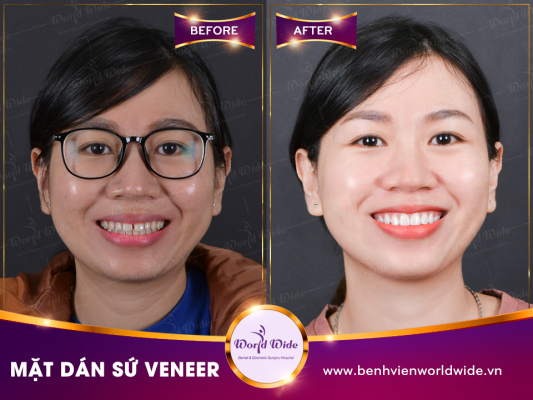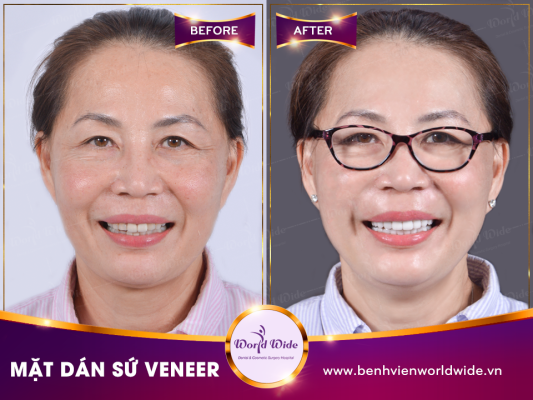Veneer porcelain veneers uses ultra-thin veneer surfaces ranging from 0.2 – 0.5mm that fit over the front surface of teeth to conceal any structural damage, discoloration or yellowing. However, before deciding to have porcelain veneers, please join Worldwide Hospital to learn more about this topic through the article below!
Types of porcelain veneers.
Porcelain veneers can be made from various types of porcelain, including:
- Pressed ceramic: a veneer made from this type of porcelain is quite hard and usually thicker than other materials.
- Stacked ceramic: allows for more precise customisation for each patient.
- Lithium disilicate: is a new type of extremely. hard porcelain. Veneers made from lithium disilicate can only be done by CAD/CAM technology.
How to take care of porcelain veneers?
No matter how good the cosmetic restoration method is, if client don’t have proper care, the life expectancy and quality of porcelain veneers will significantly decrease. However, if clients know how to take the proper care, then their veneers can last up to 15 years or longer.
Therefore, follow these guidelines to take care of porcelain veneers as advised by our experts:
Oral hygiene:
- Choose a soft toothbrush, with a suitable size, and gently brush all surfaces of the teeth.
- Brush your teeth twice a day, in the morning and before bedtime.
- Use dental floss along with mouthwash to remove plaque buildup on the teeth.
Dietary:
- It is recommended to drink filtered water and fresh fruits, which are good for both health and teeth. Avoid using carbonated drinks and drinks with artificial colors such as coffee, tea, chocolate, as the coloring agents can stain the teeth.
- Avoid of dark-colored foods that client cannot brushing teeth immediately after eaten, such as tomato sauce, soy sauce, beetroot, and foods high in sugar like gummy candies, cereals, jams, and cakes. Replace these types of foods with fruits and vegetables.
- Chewing sugar-free gum after meals can help increase saliva production and reduce plaque if brushing teeth is not
possible immediately. - Avoid chewing or biting on hard foods such as hard candies, ice, and using teeth to open bottle caps. Limit the consumption of tough foods as they can easily cause tooth fractures or breakage due to excessive biting force.
- Cigarettes are also considered one of the “enemies” of porcelain teeth. Nicotine in cigarette smoke can cause teeth discoloration, making the surface of veneer crowns no longer white and beautiful as initially.
What are the benefits of porcelain veneers compared to other methods?
- Veneer porcelain has the ability to resist stains and maintain color for many years. The color will last longer compared to when clients opt for teeth whitening.
- In addition, because only a thin layer of the tooth is shaved, the natural white color of the tooth is also reflected, helping the veneer surface achieve a completely natural aesthetic. Compared to dental fillings or dental crowns, porcelain veneers clearly demonstrate advantages in terms of aesthetics.
- Unlike porcelain crowns that cover the entire tooth from the chewing surface to the gum line, porcelain veneer is simply a thin layer covering the outer surface of the tooth, so client will not feel uncomfortable with the presence of the veneer in their mouth and do not need to adapt like dental crowns, ensuring normal chewing.
How does dental porcelain veneer affect oral health?
- The main benefit of dental porcelain veneer bonding is its aesthetic appeal. However, it can also encourage and promote better oral hygiene.
- Clients with porcelain veneers tend to take better care of their oral health to maintain their beautiful smile. Clients should consult their dentist about the best methods to protect the veneer bonding while also preserving the natural teeth underneath.
- Although porcelain veneers typically require grinding down the teeth, the amount of enamel removed is still significantly less compared to other dental options. For client who want to preserve their natural teeth, veneers can be an ideal choice.
Disadvantages of porcelain veneers.
- The colors or shapes cannot be changed once the veneer is fixed.
- Porcelain veneers are not suitable for people who have a habit of grinding their teeth. This habit can easily wear down the veneer and can easily cause breaking the veneered teeth.
- Porcelain veneers are suitable for relatively healthy teeth and not suitable for cases such as deep cavities, multiple fillings, deeply broken teeth, or lack of tooth enamel for bonding.
- Porcelain veneers are not a good solution for crooked or misaligned teeth.
- Porcelain veneers may need to be replaced on average every 10-20 years.
- Porcelain veneers do not last as long as porcelain crowns.
What is the alternative to porcelain veneers?
If the dentist determines that porcelain veneer is not the best option for you, there are other methods that you can consider:
- Composite resin: for clients with less enamel or for those who hesitate to have their teeth shaved, composite resin is an effective solution. Like porcelain veneers, composite resin can improve severe discoloration, cracks, crooked teeth, and gaps between teeth. However, composite resin has a cloudy color and does not provide the natural shine of porcelain.
- Teeth whitening: clients who only need to improve the color of their teeth (in cases where the teeth are not severely discolored) can consider teeth whitening. This treatment is simple, time-saving and takes about 1 hour.
- Porcelain crowns: porcelain crowns are similar to porcelain veneers, made to match the patient’s natural teeth. However, unlike veneers, porcelain crowns cover the entire natural tooth, meaning that dentists need to grind
down more of the tooth. - Orthodontics: client with significant bite issues may not be suitable candidates for porcelain veneers. Instead, client should choose more comprehensive methods such as orthodontics.
VENEER CASES AT WORLDWIDE HOSPITAL



 Tiếng Việt
Tiếng Việt